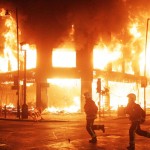 All of us will of course have been aware of the awful rioting in early August, and many of us will have heard (about) David Starkey’s comments on Newsnight. If not, or if you want to hear the discussion Verbatim then this BBC news report allows you to do that.
All of us will of course have been aware of the awful rioting in early August, and many of us will have heard (about) David Starkey’s comments on Newsnight. If not, or if you want to hear the discussion Verbatim then this BBC news report allows you to do that.
I am posting this not to make a judgement Starkey (you can do that for yourselves), but rather to reflect on why we turn to historians at all when such major events happen. Why should we seek the views of a man who is after all an Early Modern specialist any more than a poet, educationalist or other professional ? What does it say about the role of the historian ? It is noteworthy that Starkey is not the only historian to have had an opinion. Peter Ackroyd was interviewed in the The Independent today. He suggests “rioting has always been a London tradition. It has been since the early Middle Ages. There’s hardly a spate of years that goes by without violent rioting of one kind or another. They happen so frequently that they are almost part of London’s texture. The difference is that in the past the violence was more ferocious, and the penalties were more ferocious – in most cases, death.”
Perhaps this goes someway to answering my question. Do we look to historians for context to events that shock or surprise us ?




I think we do look to historians to answer questions on shocking events because there have been historical precedents. For example Dr David Starkey was alive at the time of the Brixton riots and the unrest caused by the Miners strikes so perhaps historians can identify links between the motives or consequences of riots from past ones.
Pingback: Does David Starkey put people of academic history ? | heathenhistory.co.uk